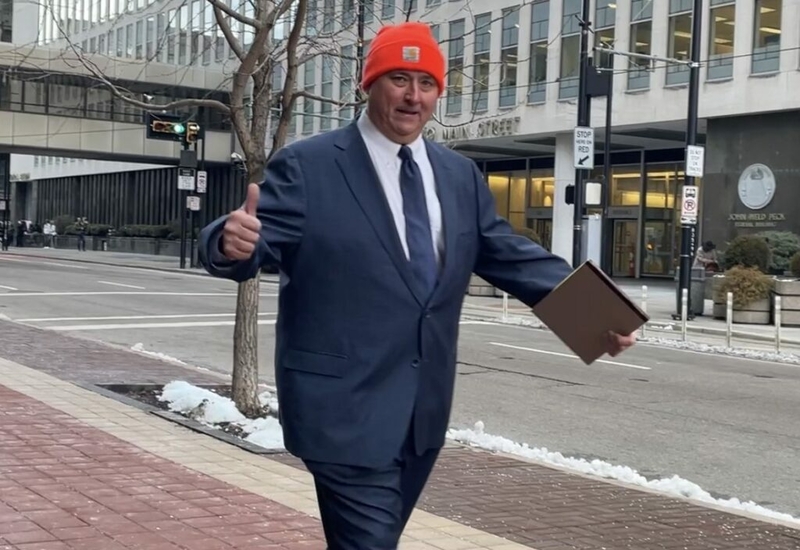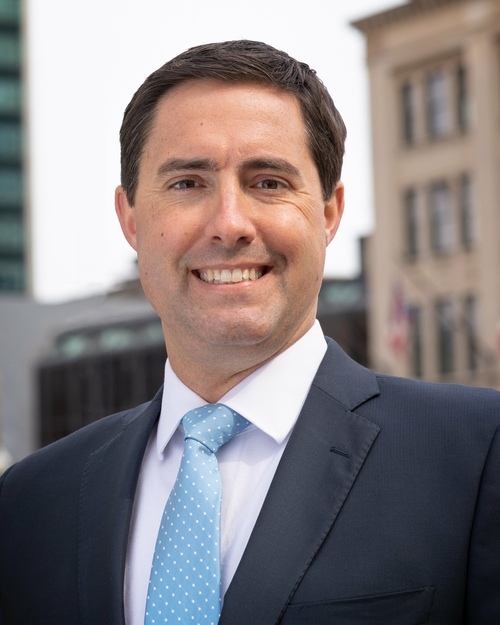Householder and Borges felony convictions just a start in stopping Ohio pay-to-play corruption

The fact that former Ohio Republican House Speaker Larry Householder and former Ohio Republican Chair Matt Borges are now convicted felons in a $61 million political bribery, $1.3 billion utility bailout scandal is just a beginning.
Ohio still has a long way to go in cleaning up a rampant culture of pay-to-play corruption that has been ripping off Ohioans and poisoning state government for decades.

In a historic moment for Ohio on Thursday, a federal jury found Householder and Borges guilty for their roles in what prosecutors said was likely the biggest bribery and money laundering scandal ever in our state.
Householder and Borges were convicted of racketeering, which is the same charge typically brought against members of organized crime.
And that’s exactly what this was, organized crime: treating our state government as a mechanism for large-scale grift, robbery, and personal enrichment.
In the summer of 2020, FBI arrests led to a slew of charges against a variety of players. Here are the results:
• Householder: Found guilty at jury trial, facing up to 20 years;
• Borges: Found guilty at jury trial, facing up to 20 years;
• Lobbyist Jeff Longstreth: Pleaded guilty, testified against Householder and Borges, facing 0-6 months;
• Lobbyist Juan Cespedes: Pleaded guilty, testified against Householder and Borges, facing 0-6 months;
• Lobbyist Neil Clark: Died by suicide in 2021 after pleading not guilty;
• FirstEnergy: Entered into a deferred prosecution agreement and paid $230 million.
• Dark money 501(c)(4) Generation Now: Pleaded guilty.
This is justice at work. What Householder and Borges have done to all Ohioans and our state government — and their own lives now that they’re going to prison — is nothing to take relish in.
It’s a very sad thing for our state, in the end, that we’ve gotten this far gone.
But justice finally being done for the people of Ohio must be applauded.
All federal agents, prosecutors, and whistleblowers involved in this case are to be appreciated and praised. Their dedication to honestly serving the people and the rule of law is performance of public duty at its most noble.
Former U.S. Attorney David DeVillers, current U.S. Attorney Kenneth L. Parker, Assistant U.S. Attorney Emily Glatfelter, Assistant U.S. Attorney Matthew Singer, FBI Special Agent Blane Wetzel, former state Rep. Dave Greenspan, and organizer Tyler Fehrman have all done a tremendous public service. As did U.S. Southern District Judge Timothy S. Black, maintaining a fair trial and steady hand.
On the flip side, we have the others: Those with their fingerprints all over this scandal who have either tolerated or actively enabled Ohio’s culture of corruption, and then buried their heads in the sand and refused to condemn this enormous, arrogant criminality.
This includes Ohio Gov. Mike DeWine and Lt. Gov. Jon Husted.
DeWine and Husted

Starting in 2017, FirstEnergy donated millions, according to Clark, to nonprofit groups and political campaigns to help elect DeWine.
Clark said in recordings played at trial that DeWine is highly influenced by campaign contributions.
After winning election, DeWine and Husted dined with FirstEnergy executives in December 2018.

In early 2019, DeWine appointed Dan McCarthy — a FirstEnergy lobbyist who operated one of its other dark money groups, Partners for Progress — to be his legislative affairs director, meaning McCarthy was in charge of representing DeWine’s interests before the General Assembly.
DeWine also appointed as chairman of his Ohio’s utility watchdog a former FirstEnergy consultant who FirstEnergy said they bribed $4.3 million just before he took his seat on the Public Utilities Commission of Ohio.
Even though he was supposed to be regulating the utility, the official, Sam Randazzo, played a role in writing the bailout legislation, according to documents released by the Ohio House.
While it was under consideration in the legislature, 2019 text messages show then-FirstEnergy VP Michael Dowling telling then-CEO Chuck Jones that Husted was working to carry water for FirstEnergy interests with lawmakers.
DeWine signed House Bill 6 the same day it was passed by the legislature.
At every revelation, DeWine has defended his FirstEnergy-affiliated appointments and staff.
On Thursday, DeWine declined to comment on Householder and Borges’ felony convictions.
Husted learned of the convictions during a press conference.
“You’re breaking that news to me,” he said. “And so the justice system usually gets it right. And hopefully that will be a lesson to others.”
Husted is currently laying the groundwork to run for governor in 2026.
Dave Yost

Text messages shown at trial also showed that Borges was assigned to try to enlist Ohio Attorney General Dave Yost’s help with the bailout. Borges, a FirstEnergy lobbyist after leaving his post as Ohio GOP chair, had previously served as Yost’s campaign manager and a political advisor.
The texts showed that in June of 2019, Yost thought the proposed utility bailout was a bad law, but he didn’t publicly oppose it because of $24,000 in campaign support he’d received from FirstEnergy.
In a text to Cespedes, Borges said “Don’t repeat this,” but Yost believed the bailout was a bad law.
Yost “‘would be out front (in opposition) if not for (FirstEnergy) support and your involvement,’” Borges quoted Yost as saying.
Householder deleted calls with Yost off of his phone, prosecutors showed.
With the federal trial done, as Ohio’s top law enforcement officer Yost is now in a position to bring some more action of his own.
On Thursday, Yost issued a statement that said, “Today, the public’s interest triumphed over self-interest, the system worked and justice was done.”
On Friday, Yost announced the state is requesting the lifting of a stay on discovery in its civil lawsuit over the case. He clarified in a release that his office can not independently bring any criminal charges, and must be invited to operate under the authority of a county prosecutor, or receive a request from the Ohio General Assembly to pursue a criminal investigation.
“Other wrongdoers in this scandal – especially and including the First Energy executives who funded the corrupt Householder Enterprise – cannot be permitted to escape scot-free,” Yost said.
Yost has given no hints of future plans for elected office, but is often speculated on by political observers as a possible future candidate for various statewide roles.
Frank LaRose
Borges and Cespedes also texted about protecting Ohio Secretary of State Frank LaRose if he faced pressure to recuse himself as chair of the Ohio Ballot Board over the repeal effort that was waged against the bailout law.

“He’s going to be a friend in this process,” Borges tesxted to Cespedes. “So let’s be prepared to speak up for him.”
Cespedes responded, “We will support him more than anyone.”
Additional texts said Borges was in touch with LaRose.
“LaRose is expecting us to be publicly supportive of him,” Borges wrote in a July 2019 text.
In another text, Borges wrote that LaRose wanted to meet with John Kiani, now chair of Energy Harbor (then FirstEnergy Solutions).
Kiani reportedly stood to make $100 million personally from the $1.3 billion swindle of Ohio ratepayers, by selling the power plants after enticing buyers with the bailout.
Just this week it was announced FirstEnergy completed the sale of its power plants in a $3.43 billion merger deal with a Texas energy company called Vistra.
LaRose is currently eyeballing a run for U.S. Senate in 2024.
Ohio Statehouse

At the Ohio Statehouse, Householder’s impact remains strong. Speaker Stephens recently selected as caucus policy director Megan Fitzmartin, who worked closely with Householder and Longstreth.
Stephens’ main GOP antagonist, Derek Merrin, voted against expelling Householder from the House after he was arrested, as did Stephens.

So, they agreed on that: Protecting Householder and trying to keep him in office after he was charged with racketeering for robbing Ohioans blind in a millions-on-the-billions political bribery grift. What does that tell you about their combined sense of ethics?
Ohio still has 9 House lawmakers, all Republican, who were in office at the time and voted for House Bill 6, and then voted against expelling Householder in June 2021, nearly a year after the arrests. They include Merrin, Majority Floor Leader Bill Seitz, Sara Carruthers, Brett Hillyer, Dick Stein, Jamie Callender, Scott Wiggam, Jay Edwards, and Don Jones.
(This section has been updated to reflect the fact that Speaker Stephen did not become a member of the House until after the general assembly where the bailout was passed and did not vote for the bailout law.)
All the other public corruption
Just a short list of other recent corruption in Ohio state government is startling, and ends up not being very short:
• Ohio taxpayers were ripped off by hundreds of millions of dollars, and nearly 12,000 Ohio schoolchildren and their families left in the lurch, when the ECOT scheme — dreamed up on a Waffle House napkin — crashed and burned in 2018.
• Also in 2018, then-Ohio House Speaker Cliff Rosenberger abruptly resigned after the FBI raided his home as subject of an investigation into his “relationship with GOP mega donor Ginni Ragan, his trips with lobbyists, and a lack of action on a payday lending reform bill, which became law after he stepped down,” according to an update story from the Columbus Dispatch.
• Another for-profit charter school operator called White Hat Management drained $67 million a year away from Ohio public schools before low test scores and soaring high school dropout rates led to a lawsuit from school boards and its eventual demise.
• The Dayton Daily News has uncovered a smattering of cases the past decade, including nepotistic hiring, undocumented purchasing, and charter school board members overpaying themselves.
• In 2021, Ohio’s Medicaid department awarded contracts worth billions of dollars to a health care middleman corporation that had only six months prior paid Ohio $88.3 million to settle a lawsuit claiming it had defrauded taxpayers of tens of millions of dollars. Just before the lawsuit was filed, the company hired an old friend of Gov. DeWine to lobby on its behalf.
• Also in 2021, state Rep. Carruthers proposed allocating $300 million of federal COVID-19 relief funds to be divvied up among Ohio’s nursing homes with no strings attached, and then raised $52,000 from the nursing home industry within a matter of weeks.
• Last year it was revealed that Republican state Sen. Frank Hoagland, who drafted legislative training curriculum schools would have to follow to allow teachers in Ohio to carry guns, owns a gun training business that seemingly fits all the required steps in the bill.
Meanwhile, the Ohio Capital Journal revealed last summer that the proposed “Backpack Bill” legislation last General Assembly to send public education money to private schools by the head was written with help from religious lobbying group the Center for Christian Virtue (CCV) and a think tank that promotes charter schools.
We now know that the “Backpack Bill” being pushed currently by the Ohio Senate will cost up to $1.13 billion.
Is this another billion-dollar giveaway to campaign donor special interests? Sure looks like it.
Now it’s up to Ohioans
All of these examples show a state government being run for narrow personal self-interest, and sweetheart lawmaking for special interest campaign donors.
Ohioans have decades of work ahead of us to purge our halls of power of these frauds and their next generation offspring, who so shamelessly game and cheat the public.
“It is in justice that the ordering of society is centered,” Aristotle said.
The hammer of justice has done its part, and the jury did theirs. Perhaps the hammer has more in store with these jury convictions secured. One can hope.
But on a much larger scale, it will now be up to all Ohioans to stand up and say, at long last, that enough is enough, and to hold all of our leaders accountable every single day and every single election.








